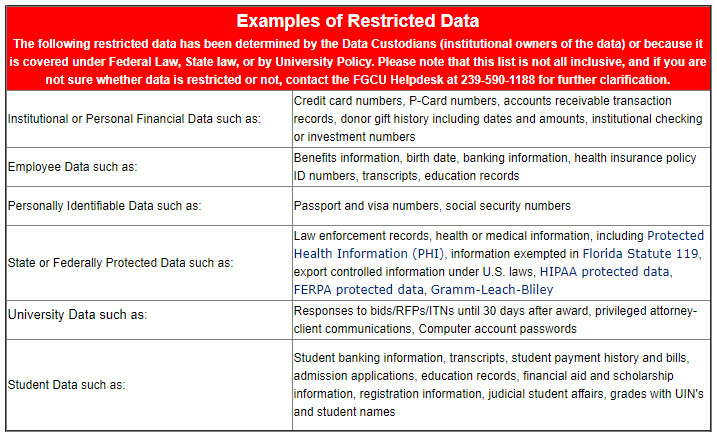What Is Restricted Data?
Restricted Data: Restricted data is data in any format: Collected, developed, maintained or managed by or on behalf of the University, or within the scope of the University activities that are subject to specific protections under federal or state law or regulations or under applicable contracts, and whose loss or unauthorized disclosure would impair the functions of the University, cause significant financial or reputational loss, or lead to potential legal liability, such as patrons social security numbers, or credit card numbers.
Please click here for the Restricted Data Policy
Please note that this list is not all-inclusive, and if you are not sure whether data
is restricted, please contact FGCU Help Desk at 239-590-1188.
How Do I Handle Restricted Data At Work?
It is okay for you to work with this data, but you have to be mindful of where you
store it
Electronic Copies:
- Your own departments file share
- If stored on your local computer or laptop, the data must be encrypted
- Remove it when you no longer need it
Physical/Hard copies:
- Should be printed locally so no one can grab it before you can
- Must be retrieved immediately if no local printer available
- Do not fax it to anyone as you cannot verify they got it
- Store in a secure location, such as a locked cabinet
- Dispose via a paper shredder
Example 1: Electronic Grade Book:
Tracy Smith downloads a copy of the grade book from Canvas. The grade book in Canvas
includes the following columns: UIN, student name, grade. Due to fact that the downloaded
file contains all three information about a student, this is restricted information
and Ms. Smith should encrypt the file including the grade information if she stores
it on her computer.
Example 2: Paper Grade Book:
Tracy Smith has a binder in her office that includes the grades of her students from
the past years. The students are all identified by UIN and name, and along their names
are their grades. Ms. Smith can keep this grade book as long as she stores it in a
locked location, such as a locked filing cabinet, or locked bin.
How do I Handle Restricted Data at Home?
- Remote access to the data must be done via FGCU's VPN services unless you use systems such as Gulfline or Canvas. These systems use a secured connection (SSL) and require authentication – Click here for more information on connecting remotely
- It is strongly advised to not download restricted data to your remote computing device
- If downloaded, it must be encrypted –Link to ITS site explaining encryption
- Remove it when you no longer need it
What is Encryption and Why Use It?
Encryption is the method of using a user supplied key, such as a password, to encode
a file into an obfuscated format. This makes the file unusable until it is decrypted
back into its original format. To do so, you have to use the key and the program
that were used to encrypt the file. Since the file will be unusable without the encryption
key, it is imperative that you use a key that you can remember.
Can I send Restricted Data to Others?
- Must not be sent via email
- May be shared with other people at FGCU using your departmental share or the cross department share
- If you must send the data to someone outside the university, it must be encrypted and sent via secure method if possible
I’m Using Restricted Data on my home PC, what Should I Do?
- Determine if you MUST save the restricted data.
- If you Must store restricted data on your PC, then your PC MUST be encrypted.
How do I Encrypt Files?
- ITS suggests using a program called 7zip to assist users with encryption and both Windows and Mac operating systems. Detailed instructions for how to encrypt/decrypt a file can be found on the ITS web site. – Link to ITS site explaining encryption
How Do I Dispose Equipment that has stored Restricted Data?
- Devices such as desktop computers, laptops, printers, tablets must be disposed of by one of the technology departments at FGCU to prevent restricted data from leaving the university
- Other storage devices, such as CDs, flash drives, tapes must be disposed of via the office of Records Management
-
Where Can I Store Restricted Data?
Toggle More Info -
What about Cloud Storage, or Flash Drives?
Toggle More Info -
I May Have Lost Some Data. What Do I Do?
Toggle More Info -
How Long Can I Store Restricted Data?
Toggle More Info


